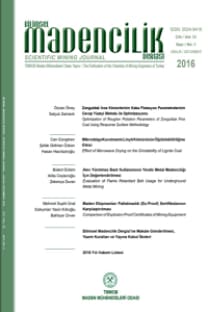AŞIRI ÖĞÜTMEYLE MEKANİK OLARAK AKTİFLEŞTİRİLMİŞ ATIK MERMER TOZLARI KULLANILARAK YAPAY VOLLASTONİT ÜRETİMİ ve KULLANIMI
Bu çalışmada, aşırı öğütme yoluyla mekanik olarak akti.eştirilmiş mermer sanayi toz atıkları çamuru ve kuvars tozu karışımları kullanılarak yapay vollastonit (CaSiO3) üretimi üzerinde durulmuştur. Yapay vollastonit üretimi sürecinde mermer ve kuvars tozu karışımının kavurma sırasındaki davranışının aşırı öğütmeyle etkileşiminin ortaya çıkarılması amaçlanmıştır. Mermer tozu ve kuvars tozunun aşırı öğütme sonundaki davranışlarını gözlemlemek üzere, bilyalı Met değirmen kullanılarak tek başına ve karışım halinde öğütme testleri gerçekleştirilmiştir. Öğütülmemiş ve öğütülmüş karışımların yapısal ve termal özellikleri tanımlanmıştır. Karışımlarda 900°-1200°C aralığında çeşitli sıcaklıklarda kavurma işlemiyle oluşan vollastonitin izleri aranmış ve karışımdaki CaCO 3 ve SiO 2’nin tamamıyla CaSiO3’e dönüştüğü sıcaklık belirlenmiştir. Yapay olarak üretilmiş vollastonit ve doğal vollastonit, seramik karo çamuru reçetesine değişik oranlarda eklenmiş ve elde edilen tabletler 1000°-1200°C aralığında değişik sıcaklıklarda pişirilmiştir. Pişirme sonunda üretilen tabletlere çeşitli fiziksel, kimyasal termal ve mekaniksel testler uygulanarak, yapay ve doğal vollastonitin seramik malzemeye sağladığı özellikler karşılaştırılmıştır. Sonuç olarak, mermer tozu ve kuvars tozunun kavurma işlemi öncesinde aşırı öğütme yoluyla mekanik olarak akti.eştirilmesinin vollastonitin oluşum sıcaklığını düşürdüğü ve kullanıldığı seramik çamuruna pişme sonrası olumlu katkılar sağladığı ortaya çıkarılmıştır
Anahtar Kelimeler:
Marble waste, conversion roasting, wollastonite, mechanical activation
Production and Utilization of Synthetic Wollastonite by using Waste Marble Powders Activated Mechanically via Intensive Milling
In this study, synthetic wollastonite (CaSiO3) production by using a mixture of marble industry waste sludge powders and quartz powders which were mechanically activated via intensive milling at the same time was emphasized. It has been intended to reveal the interaction between the behaviour of mixture of marble and quartz powders during roasting and intensive milling in the synthetic wollastonite production process. In order to observe the behaviour of marble powder and quartz powder mixture at the end of intensive milling, milling tests were performed individually and as mixture by using a Met ball mill. Structural and thermal specifications of non-milled and milled mixtures were defined. The foot prints of wollastonite formed by roasting process at various temperatures in the range of 900°-1200°C were searched for within the mixtures and the temperature at which the CaCO3 and SiO 2 in the mixture entirely convert to CaSiO3 is determined. Synthetically produced wollastonite and natural wollastonite were added to the ceramic tile formula and tablets acquired were fired at different temperatures in the range of 1000°-1200°C. The specifications enabled to the ceramic material by synthetic and natural wollastonite were compared via running various physical, chemical, thermal and mechanical tests on tablets produced at the end of firing. In conclusion, it has been revealed that the process of mechanical activation of the mixture of marble powder and quartz powder via intensive milling prior to the roasting process, lowers the temperature at which wollastonite is formed, and provides favourable post-firing contributions to the ceramic tile sludge
Keywords:
Marble waste, conversion roasting, wollastonite, mechanical activation,
- ISSN: 2564-7024
- Yayın Aralığı: Yılda 4 Sayı
- Yayıncı: TMMOB Maden Mühendisleri Odası
Sayıdaki Diğer Makaleler
Meryem GÖKTAŞ, Murat ERDEMOĞLU
BORİK ASİT LİÇİ İLE TOSYA LİNYİT KÖMÜRÜNDEN KÜL ve KÜKÜRT GİDERİMİ
Hasan HACIFAZLIOĞLU, Dilara UÇKAN
SCHMIDT SERTLİĞİ İLE KESİLEBİLİRLİK PARAMETRELERİ ARASINDAKİ İLİŞKİLERİN İNCELENMESİ
Serdar YAŞAR, Mehmet ÇAPİK, Ali Osman YILMAZ
ZONGULDAK TAŞKÖMÜRÜ HAVZASI UZUNAYAKLARI İÇİN BİR TAVAN GÖÇEBİLİRLİK SINIFLAMASININ GELİŞTİRİLMESİ
